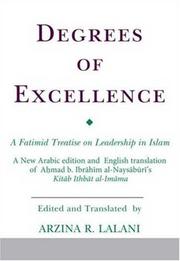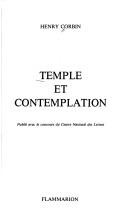Book
ISBN: 9780754659525 0754659526 Year: 2008 Volume: CS 900 Publisher: Aldershot Burlington Ashgate
Abstract | Keywords | Export | Availability | Bookmark
 Loading...
Loading...Choose an application
- Reference Manager
- EndNote
- RefWorks (Direct export to RefWorks)
Fatimites --- Ismailites --- Islamic philosophy --- Fatimides --- Ismaéliens --- Philosophie islamique --- History. --- Historiography. --- Doctrines. --- Greek influences --- Histoire --- Historiographie --- Doctrines --- Influence grecque --- Fātimides --- Ismaéliens
Book
ISBN: 9782296075979 Year: 2009 Volume: *26 Publisher: Paris L'Harmattan
Abstract | Keywords | Export | Availability | Bookmark
 Loading...
Loading...Choose an application
- Reference Manager
- EndNote
- RefWorks (Direct export to RefWorks)
Assassins (Ismailites) --- Assassins (Ismaéliens) --- Assassins (Ismaéliens) --- Moyan-Age --- croisades --- les Assassins --- Hasan-i Sabbah --- Perse --- Iran --- Syrie --- la mouvance islamique ismaélienne --- politique et religion --- Islam --- radicalisme
Book
ISBN: 9782204151535 220415153X 220415153X Year: 2022 Publisher: Paris : Les Éditions du Cerf,
Abstract | Keywords | Export | Availability | Bookmark
 Loading...
Loading...Choose an application
- Reference Manager
- EndNote
- RefWorks (Direct export to RefWorks)
"Imam ismaélien, calife fatimide et dernière manifestation de la divinité druze sur Terre, al-Hakim bi-amr Allah, mort en 1021, relie les ismaéliens, les Fatimides et les Druzes, courants hétérodoxes aux marges de l'islam. De l'histoire de cette figure fondatrice jusqu'au XIXe siècle, l'auteur décrypte l'influence de ces trois courants en faisant la part de la réalité historique et du mythe".
Ismaéliens --- Druzes --- Islam et ésotérisme. --- Histoire. --- Al-Hākim bi-amr Allāh --- Fāṭimides --- Fāṭimides (dynastie) --- Ismaéliens

ISBN: 2864321130 9782864321132 Year: 1991 Publisher: Lagrasse Verdier
Abstract | Keywords | Export | Availability | Bookmark
 Loading...
Loading...Choose an application
- Reference Manager
- EndNote
- RefWorks (Direct export to RefWorks)
Chi'a --- Chi'isme --- Chia --- Chiisme --- Chiisme duodécimain --- Free will and determinism (Islam) --- Imamisme --- Ismailites --- Ismaéliens --- Ismaëlieten --- Libre arbitre et determinisme (Islam) --- Sh-i'ah --- Shi'ah --- Shi'ism --- Shiah --- Shiism --- Sji'a --- Sji'isme --- Sjia --- Sjiïsme --- Vrije wil en determinisme (Islam) --- shî'isme --- Assassins (Ismaéliens) --- Batinites --- Islamic sects --- Regicides --- Assassins (Ismaéliens) --- Assassins (Ismailites) --- 297.17
Multi
ISSN: 07690282 ISBN: 2864322420 9782864322429 Year: 1986 Volume: [11] Publisher: Lagrasse Verdier
Abstract | Keywords | Export | Availability | Bookmark
 Loading...
Loading...Choose an application
- Reference Manager
- EndNote
- RefWorks (Direct export to RefWorks)
Assassins (Ismailites) --- Shi'ah --- Philosophy, Persian --- Islamic philosophy --- Assassins (Ismaéliens) --- Chiisme --- Philosophie persane --- Philosophie islamique --- Doctrines --- Sources --- Early works to 1800 --- Ouvrages avant 1800 --- Philosophy, Islamic. --- Ismailites --- Theology. --- Shīʻah --- Philosophy, Iranian. --- Assassins (Ismaéliens) --- Ismailites - Theology.

ISBN: 9781845111458 1845111451 Year: 2010 Publisher: London : I.B. Tauris,
Abstract | Keywords | Export | Availability | Bookmark
 Loading...
Loading...Choose an application
- Reference Manager
- EndNote
- RefWorks (Direct export to RefWorks)
Imamate --- Leadership --- Ismailites --- Islamic philosophy --- Imamat --- Ismaéliens --- Philosophie islamique --- Early works to 1800. --- Religious aspects --- Islam --- Doctrines --- Ouvrages avant 1800 --- Aspect religieux --- Islamic philosophy. --- Imāmat --- Ismaéliens --- Leadership - Religious aspects
Book
ISBN: 9782811109585 2811109587 Year: 2013 Publisher: Paris : Karthala : Institut d'études de l'Islam et des sociétés du monde musulman,
Abstract | Keywords | Export | Availability | Bookmark
 Loading...
Loading...Choose an application
- Reference Manager
- EndNote
- RefWorks (Direct export to RefWorks)
Histoire religieuse de la communauté des Khojah, commerçants ismaéliens établis dans le Sind, au Pakistan. L'ethnologue relate la formation de ce groupe qui se réunit en 1843 sous la bannière d'un chef spirituel, l'âghâ khân. Il explique l'essor des Khojah sous l'Empire britannique, l'évolution libérale de leurs doctrines puis les difficultés qu'ils éprouvèrent lors de la partition des Indes.
Ismailites --- Khojahs --- Aga Khans --- Ismaéliens --- Khojas --- History --- Histoire --- Islam --- Aga Khan --- Ismaéliens --- Aga Khāns --- History. --- Islam - Pakistan - Sindh - History --- Islam - India - History --- Aga Khan - III, - 1877-1957

ISBN: 2082107140 9782082107143 Year: 1980 Publisher: Paris Flammarion
Abstract | Keywords | Export | Availability | Bookmark
 Loading...
Loading...Choose an application
- Reference Manager
- EndNote
- RefWorks (Direct export to RefWorks)
Ismailites --- Shīʻah --- Temple of God --- Doctrines --- Shīʻah --- Temple of God. --- Doctrines. --- Shi'ah --- Ismaéliens --- Chiisme --- Temple de Dieu --- Ismaéliens --- Christian spirituality --- Islam --- Ismailites - Doctrines --- Shīʻah - Doctrines --- Iran
Book
ISBN: 9780748640775 9780748640768 0748640770 0748640762 9781474421515 1474421512 9781474421522 1474421520 9781474421522 Year: 2022 Publisher: Edinburgh
Abstract | Keywords | Export | Availability | Bookmark
 Loading...
Loading...Choose an application
- Reference Manager
- EndNote
- RefWorks (Direct export to RefWorks)
A complete history of the Fatimids, showing the significance of the empire to Islam and the wider worldThe Fatimid empire in North Africa, Egypt and Syria was at the centre of the political and religious history of the Islamic world in the Middle Ages, from the breakdown of the ‘Abbasid empire in the tenth century, to the invasions of the Seljuqs in the eleventh and the Crusaders in the twelfth, leading up to its extinction by Saladin. As Imam and Caliph, the Fatimid sovereign claimed to inherit the religious and political authority of the Prophet, a claim which inspired the conquest of North Africa and Egypt and a following of believers as far away as India. The reaction this provoked was crucial to the political and religious evolution of mediaeval Islam. This book combines the separate histories of Isma'ilism, North Africa and Egypt with that of the dynasty into a coherent account. It then relates this account to the wider history of Islam to provide a narrative that establishes the historical significance of the empire.Key FeaturesThe first complete history of the Fatimid empire in English, establishing its central contribution to medieval Islamic historyCovers the relationship of tribal to civilian economy and society, the formation and evolution of the dynastic state, and the relationship of that state to economy and societyExplores the question of cultural change, specifically Arabisation and IslamisationGoes beyond the history of Islam, not only to introduce the Crusades, but to compare and contrast the dynasty with the counterparts of its theocracy in Byzantium and Western Europe
Islam --- Fatimites --- Ismailites --- History. --- Africa, North --- History --- HISTORY / Africa / North. --- HISTORY / Europe / Medieval. --- RELIGION / Islam / History. --- Fatimites. --- Islam. --- Ismailites. --- Fatimides --- Ismaéliens --- Histoire --- Africa, North. --- Egypt. --- Middle East. --- Syria. --- Afrique du Nord --- Fātimides --- Ismaéliens --- Mohammedanism --- Muhammadanism --- Muslimism --- Mussulmanism --- Religions --- Muslims --- 647-1517
Book
ISBN: 9781780761299 1780761295 Year: 2012 Volume: 18 Publisher: London : Tauris,
Abstract | Keywords | Export | Availability | Bookmark
 Loading...
Loading...Choose an application
- Reference Manager
- EndNote
- RefWorks (Direct export to RefWorks)
Islamic law --- Inheritance and succession (Islamic law) --- Ismailites --- History --- Nuʿmān ibn Muḥammad, Abū Ḥanīfah, --- Inheritance and succession (Islamic law). --- Islamic law. --- Ismailites. --- Successions et héritages --- History. --- Islam. --- Nuʻmān ibn Muḥammad, Abū Ḥani��fah, --- Nuʻmān ibn Muḥammad, Abū Ḥanīfah, --- Ismaéliens --- Histoire. --- Islamic law - History --- Nuʿmān ibn Muḥammad, Abū Ḥanīfah, - -974. - Minhaj al-farā'iḍ

 Search
Search Feedback
Feedback About UniCat
About UniCat  Help
Help News
News